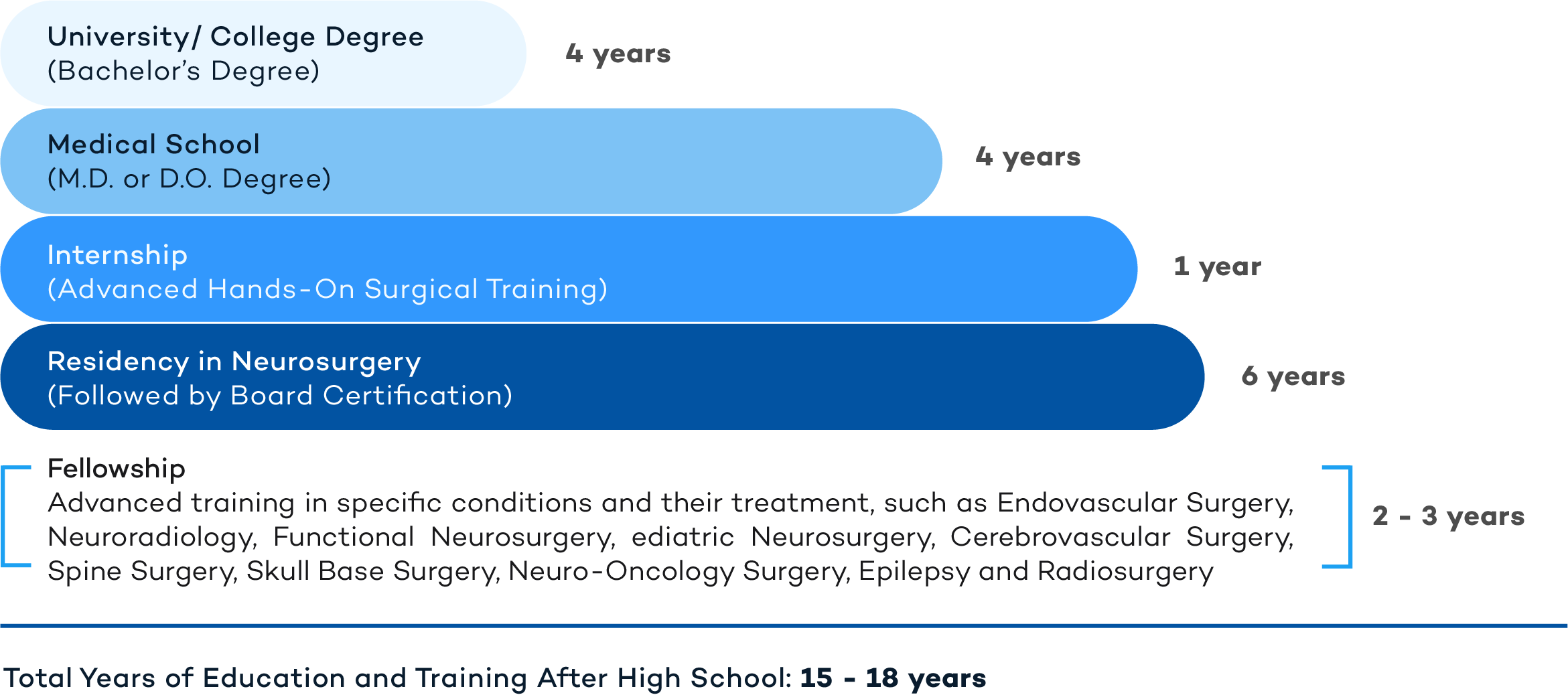

A Neurologic Surgeon or Neurosurgeon is a Board-Certified Doctor and Surgeon specialized in treating, diagnosing, and managing disorders of the peripheral and central nervous system including the brain. Neurosurgeons focus on complex conditions that require a surgical approach to management. They may diagnose and treat a variety of conditions through detailed review of history, physical examination, and assessment of mental status, vision, speech, strength, sensation, coordination, reflexes, gait, and other sensory and motor functions. They may supplement their evaluation with a full range of diagnostic tests, including computed tomography (CT), computer-assisted tomography (CAT), and magnetic resonance imaging (MRI). Neurosurgeons are the experts in developing and executing surgical plans for neurologic diseases and, when indicated, they work in consultation with neurologists.
The level of expertise and specialization in treating a particular condition, as well as the credentials and practice style, are important factors in choosing the right neurosurgeon for your condition. Your primary physician (Internal Medicine, Family Medicine, Pediatrics, or OB/GYN) or neurologist is often the doctor who will refer you to the neurosurgeon. You may do your due diligence and check his/her credentials and practice style with the help of your family and friends. You can also review their bio and hear what other patients have to say about their experience under the doctor’s care. At myDoqter, you can also see the professional recommendations given by other physicians who have witnessed first-hand the expertise and professional competency of your doctor.
Neurosurgeons have completed M.D. or D.O. degrees and have advanced residency and fellowship training in surgery. The following graph illustrates the years of education and training that a Neurosurgeon has undergone.

NEURO from the Greek word ‘neûron’ for ‘nerve’ + LOGY from the Greek word ‘logia’ which means ‘logic’ or ‘the study of’. SURGERY from the Greek roots 'kheír’ meaning ‘hand’ + ‘érgon’ meaning ‘work’.
Neurosurgeons treat conditions of the brain and the nervous system that require surgery, including the following:
Brain Tumors: are growths of abnormal cells derived from the brain structures. Some may be benign (such as acoustic neuromas) but can still grow locally and produce symptoms from compression in the skull. Others may be malignant with the potential to spread to distant sites and the rest of the body. Symptoms may include new-onset or change in the pattern of headaches, vision problems, confusion, or other sensory or motor deficits.
Hematomas: are blood collections resulting from bleeding into the brain or just beneath the skull. They can result from trauma such as accidents and falls, and may be life threatening surgical emergencies requiring prompt attention.
Brachial Plexus Injury: and other nerve compressions can produce disruption of sensory and motor functions, and may require surgical intervention.
Carpal Tunnel Syndrome: is a common condition that is produced by median nerve compression in the wrist area. This causes pain, numbness, and tingling in the affected hand and arm.
Parkinson’s Disease: is a progressive nervous system disorder that leads to motor dysfunction and the inability to control movements. Symptoms may worsen progressively with time but may start with tremors, rigid muscles, and slowing of movements.
Strokes: which are more common in the elderly, occur when the blood flow to a part of the brain gets obstructed by a blood clot or narrowing of the arteries that extend to the brain. Symptoms may include motor paralysis or numbness. Typically, symptoms will affect one side of the face, arm, or leg, but may also include problems with vision in one or both eyes, headaches, slurred speech and sometimes loss of balance.
Epilepsy: is a condition or disorder of the central nervous system leading to abnormal brain activity and seizures. Symptoms may present as jerking motions of the arms, legs, or body, or they can include a staring spell, anxiety, and temporary confusion.
Brain Aneurysms and Arteriovenous malformations: are vascular abnormalities that can lead to massive bleeding into the brain and is a very serious medical condition that needs immediate attention. The most common symptom is a sudden and extremely severe headache that may be accompanied by nausea and/or seizures. Patients often declare that they are experiencing the worst headache of their lives.
Cerebral palsy: is a condition that can be related to trauma during birth and can lead to impaired movement and reflexes. Symptoms and signs of this condition commonly occur during infancy and preschool years and may include stiff muscles, exaggerated reflexes, tremors, and learning difficulties.
Multiple Sclerosis: is an autoimmune nervous disease in which the immune system attacks the nervous system. The resulting nerve damage can produce a variety of neurologic symptoms that can present in multiple ways, including but not limited to vision problems, tremors, pain, or tingling in different parts of the body.
Pituitary Tumors: are tumors of the pituitary gland that may be benign in nature but can lead to overproduction of hormones. They can also compress the optic nerve and produce vision changes.
Cervical spinal stenosis: can occur with age and is characterized narrowing of the spaces within the bones of the spine. This is most commonly seen in the neck or lower back areas. It can lead to nerve compression and symptoms include numbness, tingling, and muscle weakness.
Hydrocephalus: occurs due to fluid accumulation deep within the brain that can produce brain dysfunction (abnormal function). Through surgical interventions, neurosurgeons can remove the fluid and alleviate pressure on the brain.
Scoliosis: is characterized by curvature of the backbone or spine that can occur in teenage years during the growth spurt.
Hyperhidrosis: is a condition in which excessive nerve activity can produce uncontrollable sweating of the armpits and palms. Although many non-surgical treatments are available, neurosurgical ‘nerve clipping’ may be a last resort approach to control excessive sweating.
Ultimately, Prevention and the Prompt and Proper Diagnosis of neurological conditions are the most important steps towards maintaining neurological and mental health. If you experience neurological symptoms, prompt consultation with your primary care physician or neurologist can help you manage these symptoms, and neurosurgeons can aid in their surgical treatment when indicated.
Measures that can aid in minimizing neurologic disease or trauma include:
You can learn more about Neurosurgery in the following links:
https://www.aans.org/en/Patients
https://www.mayoclinic.org/departments-centers/neurosurgery/sections/conditions-treated/orc-20117102